|
|
|
Sort Order |
|
|
|
Items / Page
|
|
|
|
|
|
|
| Srl | Item |
| 1 |
ID:
106987
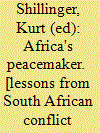

|
|
|
|
|
| Publication |
Auckland, SAIIA, 2009.
|
| Description |
260p.
|
| Standard Number |
9781920196240
|
|
|
|
|
|
|
|
|
|
|
|
Copies: C:1/I:0,R:0,Q:0
Circulation
| Accession# | Call# | Current Location | Status | Policy | Location |
| 056163 | 303.69096/SHI 056163 | Main | On Shelf | General | |
|
|
|
|
| 2 |
ID:
138770
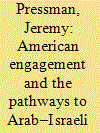

|
|
|
|
|
| Summary/Abstract |
This close empirical study of decades of US efforts to bring peace between Arab states and Israel helps reflect on Arild Underdal and Oran R. Young’s leadership typologies. Distinguishing between coercive leadership based on the incentives and sanctions that robust capabilities make possible and instrumental leadership focused more on talking, skilled mediation, and policy innovation is useful. However, this US mediation demonstrates that the two are not wholly distinct as previously suggested. The narrative of US efforts from Richard M Nixon to William J Clinton, including 22 cases of US involvement in Arab–Israeli mediation, suggests successful US mediation has been based on four factors. US involvement has led to breakthroughs when the US administration was highly engaged and kept at the problem after an initial diplomatic setback; benefitted from an exogenous event; managed that event to the US advantage; and dealt with strong Arab and Israeli partners.
|
|
|
|
|
|
|
|
|
|
|
|
|
|
|
|
| 3 |
ID:
052820
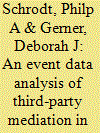

|
|
|
| 4 |
ID:
110206
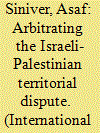

|
|
|
|
|
| Publication |
2012.
|
| Summary/Abstract |
This article presents the case for arbitrating the territorial dispute over the West Bank between Israel and the Palestinian Authority. After nearly two decades of intense intermediary activity but with still no signs of progress, and against the inability of the parties themselves to move towards reconciliation, the article argues that as a method of conflict resolution, mediation has exhausted its primary objective - namely the establishing of direct channels of communication between the disputants - and it is now time to examine alternative methods to conflict resolution. The article debunks the myths surrounding the success of American mediation in the conflict, and uses the historical case of the Taba arbitration between Israel and Egypt to demonstrate under what terms the arbitration of the West Bank dispute might be presented, while taking into consideration its advantages and drawbacks compared with the more established method of mediation in this conflict.
|
|
|
|
|
|
|
|
|
|
|
|
|
|
|
|
| 5 |
ID:
089512


|
|
|
|
|
| Publication |
2009.
|
| Summary/Abstract |
Mediating regional conflict in Asia is a delicate art. It requires an acute understanding of the unique mediation culture in the region. China's mediation in the nuclear crisis on the Korean Peninsula reveals key elements of this art and offers useful lessons. China's experience illustrates that an influential but neutral and harmony-oriented mediator is critical in the Asian context. It is equally essential for the mediator to (1) abide by the principle of noninterference in other countries' internal affairs while maintaining active intervention as dispute escalates, (2) stand ready to nudge those being mediated toward action when necessary to advance peaceful negotiations, (3) establish an optimal environment to foster communication and reduce hostility between the major parties in dispute, (4) serve as an honest broker but remain firm in its own position and cautiously take initiatives to guide the talks, (5) advocate a step-by-step approach to the negotiation process, and (6) aim for the outcome of negotiations to be a give-and-take agreement. Although Asia is a conflict-prone region, Asians traditionally confuse mediation with meddling. As a result, non-Asians often try to serve as mediators for Asia. For more effective mediations, it is essential that Asians rediscover their useful mediation skills and that non-Asians better understand the Asian art of mediation when they act as mediator.
|
|
|
|
|
|
|
|
|
|
|
|
|
|
|
|
| 6 |
ID:
174375
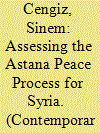

|
|
|
|
|
| Summary/Abstract |
Since 2011, numerous peace initiatives have been initiated out by several actors to end the Syrian civil war in a peaceful way. This article presents the “Astana Peace Process” brokered by Russia, Turkey, and Iran in early 2017 as a case study of a mediation and examines its predecessors to understand the reasons for the failures of those attempts and develops an assessment of the Astana peace process itself. To gain a better understanding of the Astana peace process, this article incorporates the efforts of main actors, their approaches, and the context of the war. In doing so, the article begins by describing the background of the civil war and then uses traditional concepts in mediation theory to elucidate the limitations of the unsuccessful attempts. Next, it investigates how the Astana peace process was different and the driving factors that encouraged the states to engage in this process and argues that Astana peace process’s overall effectiveness is likely to remain limited due to the conflicting interests of the mediators.
|
|
|
|
|
|
|
|
|
|
|
|
|
|
|
|
| 7 |
ID:
163369
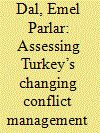

|
|
|
|
|
| Summary/Abstract |
This paper aims to shed light on Turkey’s conflict management role after the Cold War using a three-layered framework consisting of the layers of actorness, approaches and tools. In doing so, it seeks to profile Turkey’s international conflict management since the Cold War years with a special focus on the nature of its participation in conflict management as an active or passive actor, the perspectives from which it approaches conflict management, and the conflict management instruments it utilises. First, the paper will provide a conceptual framework of international conflict management based on the above-mentioned triad of actorness, approaches and tools as derived from the existing literature. Second, it will apply the selected three-layered analytical framework to Turkey to decipher its strengths and limitations in managing international conflicts.
|
|
|
|
|
|
|
|
|
|
|
|
|
|
|
|
| 8 |
ID:
074557
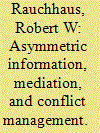

|
|
|
|
|
| Publication |
2006.
|
| Summary/Abstract |
This article examines mediation in conflicts using both a game-theoretic model and a quantitative analysis. The game-theoretic model suggests that mediator effectiveness rests primarily on the ability of third parties to provide critical information about the disputants' reservation points. The empirical analysis finds that mediation that targets asymmetric information is a highly effective form of conflict management. Moreover, the results suggest that mediation outperforms other forms of third-party intervention, including those that entail coercion. Both the model and quantitative analysis indicate that impartial mediators will generally outperform biased ones. Along with providing new information on conflict management, the quantitative analysis also has broader implications for IR theory. The results provide empirical support for the rationalist claim that asymmetric information is one of the root causes of war.
|
|
|
|
|
|
|
|
|
|
|
|
|
|
|
|
| 9 |
ID:
172195
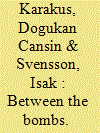

|
|
|
|
|
| Summary/Abstract |
Previous research on ceasefires in armed conflicts has primarily focused on the aggregated country-level of analysis. By contrast, this article contributes by examining the local-level dynamics of local ceasefire arrangements. In particular, this study examines a novel set of 106 local-level ceasefire arrangements in the Syrian Civil War, reached between the years 2011 to 2017. Most (72 percent), but not all, of the ceasefire arrangements were respected during the stipulated time period. We argue that informal and domestic peacemaking should outperform formal and external approaches in managing conflicts with multiple rebel groups, ongoing violence, and different fronts such as in Syria. We find that the presence of insider mediators (“insider-partial”) as well as confidence-building measures between the belligerents are positively associated with successful ceasefire arrangements, whereas explanations emphasized by previous research—external third-party mediation as well as various indicators of quality of agreement—fail to explain outcomes of ceasefires. Yet, we also find some evidence indicative of a selection effect in that external mediators are associated with more difficult conflict situations. The study of local ceasefires in the Syrian Civil War can stimulate further examinations of the micro-dynamics of peacemaking in civil wars, including the causes and consequences of local ceasefires.
|
|
|
|
|
|
|
|
|
|
|
|
|
|
|
|
| 10 |
ID:
158141
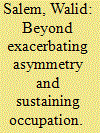

|
|
|
|
|
| Summary/Abstract |
Third party mediation is critical in pushing forward a new peace process that is based on Israeli and Palestinian compliance in fulfilling previous agreements, including an Israeli freeze on settlements. The freeze will be part of a transformative constructionist process that will allow both sides to negotiate from a more symmetrical position. It will also create more trust among the Palestinians by communicating that Israeli intentions are not about grabbing their land while discussing peace.
|
|
|
|
|
|
|
|
|
|
|
|
|
|
|
|
| 11 |
ID:
084347
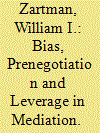

|
|
|
|
|
| Publication |
2008.
|
| Summary/Abstract |
Although analysts have long held that bias disqualifies a mediator, more recent analysis, pioneered by Saadia Touval, shows that bias can be quite helpful to mediation under the assumption that the mediator delivers the agreement of the party toward which it is biased. Of course, the mediator is still expected to be trustworthy in dealing with the parties and reliable in communications. Prenegotiation and diagnosis, probably the least analyzed early stages of negotiation, are shown to be crucial to a successful negotiation and the necessary preconditions to an efficient and effective process. Leverage, the term for "power" in negotiation, is a scarce resource and takes the form of effective persuasion rather than material inducements and punishments; it depends above all on the need of the conflicting parties for an agreement, which in turn depends on the attractiveness of their alternatives or security points (BATNAs).
|
|
|
|
|
|
|
|
|
|
|
|
|
|
|
|
| 12 |
ID:
187040
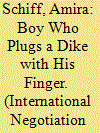

|
|
|
|
|
| Summary/Abstract |
This article highlights the United Nations’ potential contribution in the niche of crisis management. Drawing from the crisis-based approach’s insights on crisis mediation efficacy, and Carnevale’s conceptualization of the mediator’s various strengths as the sources of leverage in mediation, the study explores UN Special Coordinator for the Middle East Peace Process Nickolay Mladenov’s mediation during the Gaza-Israel crisis in 2018–2019. I argue that a combination of contextual and behavioral factors enabled Mladenov to influence the crisis bargaining environment and pull Israel and Hamas back from the brink. These factors included both parties’ need to avoid further escalation; the mediating skills of the UN envoy; the envoy’s reputation, which led others to perceive him as the right person for the mediation mission; the UN mediator’s use of a blend of strategies and tactics; and Mladenov’s ability to apply a range of strengths, including hard power.
|
|
|
|
|
|
|
|
|
|
|
|
|
|
|
|
| 13 |
ID:
151227
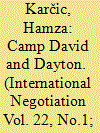

|
|
|
|
|
| Summary/Abstract |
U.S. mediation towards resolving the Arab-Israeli conflict in the 1970s and Balkan conflicts in the 1990s may not seem comparable at first. Differences between these conflicts in terms of history, duration and dynamics abound. The nature and level of U.S. involvement provides further contrasts. Yet, the Camp David negotiations in 1978 and the Dayton Peace Talks in 1995 offer striking parallels in terms of third-party mediator actions undertaken. This article compares the two summits by applying the analytic framework developed by Curran, Sebenius and Watkins to categorize third party mediator strategies. The analysis builds on this framework and deduces common tactics employed by third-party mediators at Camp David and Dayton.
|
|
|
|
|
|
|
|
|
|
|
|
|
|
|
|
| 14 |
ID:
087306
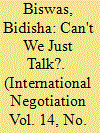

|
|
|
|
|
| Publication |
2009.
|
| Summary/Abstract |
The international community has been increasingly interested in the ways by which external actors help end civil conflicts. This study compares and contrasts the conflicts in Sri Lanka and Indonesia (Aceh) in order to understand why international intervention has failed in Sri Lanka but has been successful in Aceh. In Sri Lanka, the intensely fractured nature of domestic politics has been one of the most significant obstacles to successful peace talks. Although international intervention has become necessary to overcome the trust barriers between the two parties, it is seen as a threat to national sovereignty and therefore rejected. In contrast, the democratization process in Indonesia created new opportunities for peace. The political will of principal actors and their receptivity to external assistance enabled a peace agreement in 2005. The findings of this study show that both domestic political consensus and a supportive international environment, which protect the reputational concerns of the negotiating state, are necessary for resolving protracted ethnonational conflicts.
|
|
|
|
|
|
|
|
|
|
|
|
|
|
|
|
| 15 |
ID:
183956
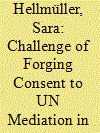

|
|
|
|
|
| Summary/Abstract |
This article analyzes how the internationalization of civil wars influences conflict parties’ consent to UN mediation processes. Illustrated by the UN mediation in Syria, I argue that internationalization influences consent directly by obstructing the advent of a costly stalemate and the parties’ perception of mediation as a ‘way out,’ and indirectly by reducing mediators’ leverage and perceived impartiality thereby limiting their tools to foster consent. The article makes three contributions. First, it presents a novel conceptual framework to understand the impact of internationalization on conflict parties’ consent. Second, it provides a long-term analysis of UN mediation in Syria from 2012–2020. Third, it contributes to a broader discussion about how civil wars end. This is of particular relevance as the prioritization of a political over a military end to civil wars, which was dominant in the early post-Cold War period, is no longer unquestioned.
|
|
|
|
|
|
|
|
|
|
|
|
|
|
|
|
| 16 |
ID:
187038
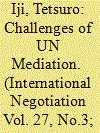

|
|
|
|
|
| Summary/Abstract |
This is the second of a two-part special issue of International Negotiation devoted to examining mediation conducted by the United Nations. The articles contribute to our understanding of the UN as an international mediator, notably its relevance and efficacy, and the challenges and opportunities it faces. Now, past its 75th anniversary, the UN can and still does mediate in the evolving international environment, showing a mixed track record of limitations and achievements in a variety of peacemaking engagements.
|
|
|
|
|
|
|
|
|
|
|
|
|
|
|
|
| 17 |
ID:
167452
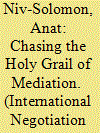

|
|
|
|
|
| Summary/Abstract |
President Clinton was deeply engaged and invested in the Israeli-Palestinian peace process, and this commitment seems to transcend administrations as Presidents Bush, Obama, and more recently Trump have made considerable efforts to mediate the Palestinian-Israeli conflict. This article addresses the question of why would a US president risk his own legacy and the reputation of the office as an international mediator to try to solve this complicated case in the face of expected and proven failures? This study traces efforts made by recent US Presidents to mediate the long-standing protracted conflict between Palestinians and Israel understand the reasons for the ongoing US commitment to this process, and why different presidents and their administrations persist in their mediation attempts where their predecessors failed.
|
|
|
|
|
|
|
|
|
|
|
|
|
|
|
|
| 18 |
ID:
168171
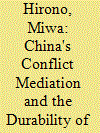

|
|
|
|
|
| Summary/Abstract |
China's efforts in conflict mediation are an important test of the durability of the principle of non-interference. By analysing the approaches and means of China's post-2014 mediation efforts in Afghanistan, this article finds that China's behaviour shows it engages in medium-level interference in domestic affairs, but mostly with the host government's concurrence. This is because of the two forms China's mediation takes. In a bilateral context, China's mediation takes the form of “incentivizing mediation,” in which its economic power, and its omnidirectional foreign policy, provide incentives or leverage for warring factions to come to the negotiation table, but which also lets the warring factions formulate their own roadmap to peace talks. In a multilateral context, China sometimes engages in “formulative mediation,” in which the mediators, not the disputing parties, formulate a roadmap to peace talks.
|
|
|
|
|
|
|
|
|
|
|
|
|
|
|
|
| 19 |
ID:
168169
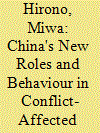

|
|
|
|
|
| Summary/Abstract |
China's view on the sanctity of state sovereignty has slowly but inexorably been transformed, and the country has found it difficult to continue to adhere to the principles of non-interference and non-intervention with the same degree of rigour as during the Cold War era. This special section will explore what the principles mean to China today; why and how Beijing has become active in peacebuilding and conflict mediation; and what implication China's approach to the principles has for its position in the global liberal order. This article sets the scene by firstly demonstrating that defining the principles has always been a political act, and secondly offering new discussions about how China's expanding economic power forced the country to more actively engage in politics of conflict-affected regions. Finally, it offers a conceptual framework to explain why and how China has become increasingly active in peacebuilding and conflict mediation.
|
|
|
|
|
|
|
|
|
|
|
|
|
|
|
|
| 20 |
ID:
153626
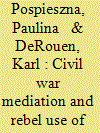

|
|
|
|
|
| Summary/Abstract |
Violence against civilians is portrayed as an antecedent of civil war, a cause, or both. Civil war creates opportune environments for planning and carrying out these acts that in turn can have detrimental effects on peace processes. Since not all civil war factions will see peace as beneficial, some actors may use violence to undermine the peace talks. The rebels may use indiscriminate violence to demonstrate their ability to exact costs on the government thus forcing the latter to negotiate. This article focuses upon acts of violence committed by rebel groups during mediated peace process. The central hypothesis is that violence against civilians increases the probability of mediation that in turn increases the prospects for violence. Using all civil war episodes from 1970 to 2008 as observations results from bivariate probit analysis endogenizing the choice of mediation bear out this theoretical argument.
|
|
|
|
|
|
|
|
|
|
|
|
|
|
|
|
|
|
|
|
|